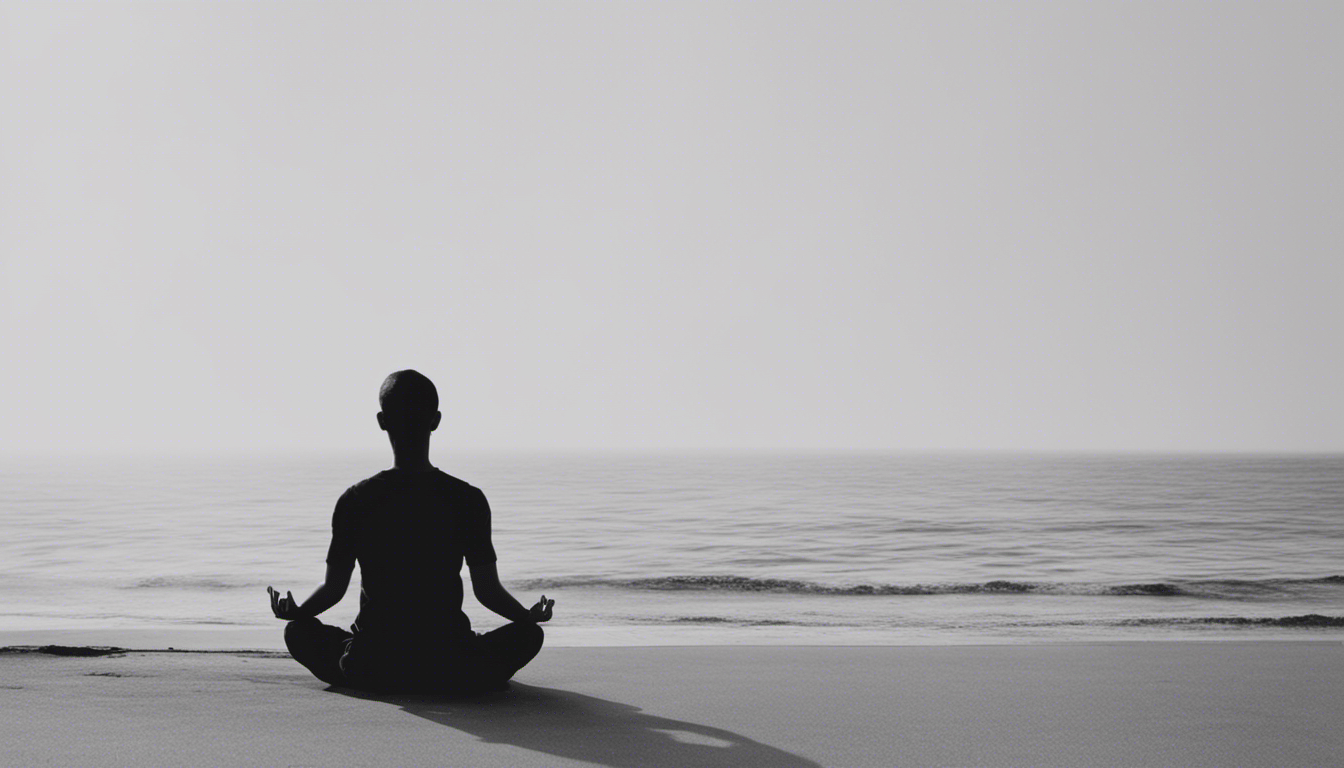Meditation is a great Practice.
‘The greatest thing in the world is to know how to belong to oneself.’
– Michel de Montaigne
For the longest period, overworking has been glorified in our societies. Yet, putting overtime at work, losing sleep, overstudying, or always being available for others is appreciated so greatly, despite its harmful effects.
It is important to maintain a healthy balance between all responsibilities and taking time for yourself. However, it is essential to develop habits that help you unwind and relax even while doing so.
Meditation is a great practice of doing so. The benefits of this method are not just preventive but also remedial.
So following the words of Montaigne, perhaps it is time to understand how to belong to oneself.
What Is Meditation?
Meditation is a wide variety of methods designed to promote greater awareness and a focused mind. Meditation is another strategy for changing awareness that has been found to provide a variety of psychological advantages.
Mindfulness practice has been observed in many religions and cultures. For thousands of years, nearly every religion has used the practice of meditation in their religious practices such as Islam, Buddhism, Hinduism, and more.
Despite its connection to religions, meditation itself is not a religious practice. Rather it’s a psychotherapeutic method that helps relieve stress, pain, anxiety, and more from an individual.
The dictionary definition of meditation is its meaning in Latin, derived from the word meditatum. It is often described as
“thinking deeply about something.”
“focusing on one’s mind for some time.”
However, many psychologists have proposed their definitions in modern times. Most of which revolve around the stress of the role of attention in this practice. It is often described as
“discursive thinking,” “logic,” “mind.”
to achieve a profound, more sincere, or more relaxed state.
Over time, meditation has found its place in multiple fields of life. This raises the question; Where did the practice begin?
We are introducing the remarkable Flowtime Biosensing Meditation Headband.
History Of Meditation
Answer this question is quite more complicated than one might think. The reason is that the practice was observed in multiple different religions and cultures. Not only that but many different types of meditation practices were observed as well.
However, Davanger (2008) conducted research and concluded that there are only two real possibilities of where this age-old tradition comes from.
India: Written records found from as old as 1500 BCE in India explained the concept of meditation. Their practice is called Dhyāna or Jhāna, which is translated into meditation. These practices include mind training which is the basic concept of meditation. Many of these writings are from Hindu Vedantism traditions, and they explain numerous meditation techniques used in ancient India.
Even earlier accounts of the practice can be found in Buddhist Indian scriptures and documents dating back to a few hundred BC. However, many are of the thought that they are confused about their connections to meditation.
China: Historical types of meditation have been related to the Daoist Laozi, an ancient Chinese philosopher, and his works as far back as the 3rd and 6th centuries BC. There were plenty of types of meditation noted in this work which include;
Shou Zhong– translated as ‘guarding the middle.’
Bao Yi– translated as ’embracing the one.’
Shou Jing– translated as ‘guarding tranquility.’
Bao Pu– translated as ’embracing simplicity.’
Some believe, however, that it’s hard to know whether these were commonly used practices when the text was written or if they were freshly formed phrases. The truth is that no one knows with certainty when meditation first began.
Prominent Personalities Of Meditation
Even though no one can tell where the concept of meditation comes from, we can surely inform you about the most prominent personalities who have widely spread the practice and enhanced it, in a sense.
The Buddha From India
Siddhartha Gautama, also known as Buddha, was a prince who became a monk, sage, philosopher, and religious leader. His teachings are the foundation of Buddhism.
As a result, it’s tempting to believe that the Buddha invented or established meditation, although this isn’t the case. Many other types of meditation are mentioned in Buddhist texts, and the Buddha searched for other knowledgeable masters to learn the practice and methods of self-fulfillment. The Buddha didn’t introduce meditation, though he was crucial in propagating its importance as a discipline.
Lao-Tze From China
Lao-Tze was an old Chinese philosopher whose name translates to “Old Teacher” or “Old Master.”
He is best known for writing the Tao-te-Ching, a manuscript that encapsulates his ideas and beliefs that helped form Taoism, a philosophical school that emphasizes contemplative techniques and the concept of knowledge in silence.
Many people wonder if Lao-Tze was a single man or if the name refers to a group of people and philosophers who shared the same ideals.
We are introducing the remarkable Flowtime Biosensing Meditation Headband.
Types Of Meditation
Since the practice has multiple origins, there are plenty of different kinds of meditation. Some are related to certain religions and cultures, but all of them can be practiced by everyone.
Mindfulness Meditation
Originating from Buddhism, mindfulness meditation is the act of paying attention to your thoughts when they pass through your head. The process requires no judgment; rather, it is all about observing and noting thoughts and patterns.
This technique utilizes both attention and awareness. For example, while observing any physiological sensations, thoughts, or emotions, you might find it beneficial to focus on an object or your breath.
This meditation is ideal for individuals who don’t have access to an instructor because it can be done alone.

Spiritual Meditation
Originating from Hinduism and Daoism, spiritual meditation is identical to prayer in that it allows you to focus on your inner self. Through this exercise, you concentrate on the silence around you and seek a greater connection with your God or Universe.
Essential oils are frequently used to enhance spiritual connections. Spiritual meditation can be done at home or in a religious setting. Those who thrive in stillness and desire spiritual growth will benefit from this exercise.
Focused Meditation
Your five senses are what create the greatest focus within yourself. For example, counting beads, listening to a gong, or staring at flames is a great way of practicing focused meditation.
This practice may seem easy; however, it is quite difficult for many novices to maintain their focus for a long time. This is why it is important to consciously keep bringing your focus back to the practice.
This practice is ideal for those who want to improve and increase their focus.
Movement Meditation
Movement meditation can include any sort of movement. For example, going on a walk, gardening, Pilates; or any hobby you want to add that requires gentle movement will be considered movement meditation.
It does not necessarily have to be yoga, but if it suits you, then why not pursue it?
If you find your peace in action or a wandering mind, this practice will prove ideal for you.
Mantra Meditation
To calm the thoughts, this style of meditation uses a repeated sound. It could be a word, sentence, or sound, like the well-known “Om.”
It makes no difference whether you say your mantra aloud or quietly. However, you will be more aware and in tune with your surroundings after repeating the mantra for a while. This empowers you to reach higher states of consciousness.
Some people prefer mantra meditation because it is easier to concentrate on a single word than their breath. This is also a useful technique for individuals who appreciate repetition but dislike silence.
Transcendental Meditation
Transcendental meditation is scientifically proven and the most popular. It is similar to mantra meditation but instead uses a series of words. This is ideal for those individuals who value structure.
Progressive Relaxation
Widely used in the field of Psychology, this meditation is focused on the relaxation of one’s entire body. This type of meditation frequently entails gradually contracting and relaxing one muscle group at a time all through the body. In rare circumstances, it may also be helpful to envision a calm wave moving through your body to help you relax.
It is a great way of releasing stress and calming down before going to bed.
Loving-Kindness Meditation
Empathy, kindness, and forgiveness toward oneself and others are strengthened by this meditation.
It usually entails allowing one’s thoughts to be open to receiving love from others and then extending several good wishes to loved ones, friends, acquaintances, and all living beings.
Visualization Meditation
Visualization meditation is a practice that focuses on imagining good sceneries or images to increase emotions of relaxation, tranquility, and serenity.
It’s critical to envision the situation clearly and use all sensory experiences to add as much detail as possible during this exercise.
Another type of vision meditation involves visualizing yourself achieving personal goals to improve focus and motivation.
We are introducing the remarkable Flowtime Biosensing Meditation Headband.
Benefits Of Meditation
Meditation is a great way of improving your life as a whole. From focus and concentration to calmness and kindness, this practice helps you with all.
Here are some of the greatest benefits of meditating daily.
Reduce Stress
The main reason people even try out meditation is that it helps relieve stress. Through meditation, one relaxes their body and calms their mind. When done mindfully, they become more aware of their surroundings and are not affected by the small things.
This is why it is a great way of reducing stress and feeling in control of yourself.
Controls Anxiety
Less stress means less anxiety.
A study found that eight weeks of mindfulness meditation reduced anxiety symptoms, increased positive self-statements, and improved stress responses and coping in individuals with generalized anxiety disorder.
All the more reason to make mediation a part of your daily routine.
Promotes Emotional Health
Meditation focuses on mindfulness, opening oneself up to more perspectives, and reducing negative habits and feelings. But, as stated above, it is also great at reducing stress and anxiety. This is why it works so effectively when it comes to improving one’s emotional health.
Not only this but movement meditation and loving-kindness meditation help the individual reach a level of strength that they feel empowered to manage their emotions.
Enhances Self-Awareness
Some types of meditation can help you have a better understanding of yourself and become your best self.
Such as mindful or self-inquiry meditation, which is specifically designed to help you better understand yourself and how you interact with others.
Other types enable you to spot dangerous or self-deprecating thoughts. The notion is that as you become more conscious of your thought patterns, you may re-route them proves more beneficial.
Lengthens Attention Span
As we discussed before, focused meditation is great for improving focus and increasing your attention span. This helps you focus more effectively on things that require so. It also helps avoid procrastination and become more productive.
Improves Physical Health
Meditation is known to help improve sleep, decrease pain, and improve blood circulation in the body. Simply, this is because of the lack of stress and anxiety that it causes.
When your body is relaxed, and your mind is calm, your body has more time to improve rather than just survive.
We are introducing the remarkable Flowtime Biosensing Meditation Headband.
How To Start Meditating?
Meditation is quite simple and easy to begin. It can be done anywhere, and different meditations can be done while working, such as movement meditation.
However, here is a simple way of meditating anywhere.
Find a quiet and comfortable place to sit. Ensure that you won’t be disturbed for the duration of the meditation.
Close your eyes. You can use eye masks, and for an even more comfortable experience, you can use cool gel eye masks.
Don’t try to guide your breathing, rather just breathe naturally.
Concentrate on the breathing and the movement of the body every time you inhale and exhale. As you breathe, pay attention to how your body moves. For example, pay attention to your chest, shoulders, rib cage, and belly. Simply concentrate on your breathing without attempting to manipulate its rate or intensity. Return your attention to your breath whenever your mind wanders.
Repeat for as long as required.
And just like that, you can now enjoy the many benefits of meditation.
It has never been more essential to love yourself and treat yourself with kindness in a fast-paced world like ours.
The Dream Oak
Body, Mind, And Soul For A Fulfilled Life!








